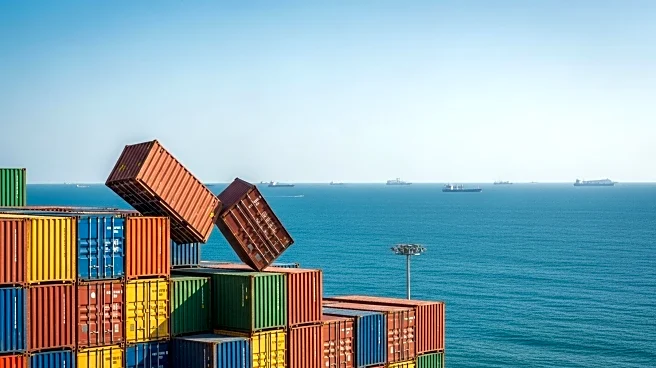What's Happening?
Shipping container rates from Asia to the U.S. are experiencing downward pressure due to rising tariffs and uncertainty in U.S. trade policy. According to the Global Port Tracker from the National Retail Federation (NRF) and Hackett Associates, U.S. retailers have stocked up significantly ahead of anticipated tariff increases. This has led to a near-record peak in import volumes during the summer. However, the inability to make long-term business plans due to unpredictable trade policies is causing concern among retailers. The NRF Vice President for Supply Chain and Customs Policy, Jonathan Gold, highlighted the critical nature of long-term planning for business success. The forecast for container imports shows a decline in volumes for the remainder of the year, with December expected to be the slowest month since March 2023.
Why It's Important?
The decline in container rates and import volumes has significant implications for U.S. retailers and the broader economy. Retailers face challenges in managing inventory and planning for future business operations due to the uncertainty surrounding tariffs. This situation could lead to increased costs and reduced profitability for businesses reliant on imports. Additionally, the chemical industry, which uses container ships to transport polymers and other materials, may experience disruptions. The ongoing tariff situation could affect supply chains and pricing strategies, impacting consumer prices and economic stability.
What's Next?
As the year progresses, stakeholders will closely monitor the impact of tariffs on trade volumes and container rates. Retailers may need to adjust their strategies to cope with fluctuating import costs and potential supply chain disruptions. The NRF and Hackett Associates will continue to provide forecasts and analysis to guide businesses in navigating these challenges. Policymakers may also face pressure to address trade uncertainties to stabilize the market and support economic growth.
Beyond the Headlines
The broader implications of declining container rates and tariff uncertainty extend to international trade relations and economic diplomacy. The U.S. and its trading partners may need to engage in negotiations to mitigate the impact of tariffs and foster a more predictable trade environment. This situation highlights the interconnectedness of global economies and the importance of stable trade policies for economic prosperity.









